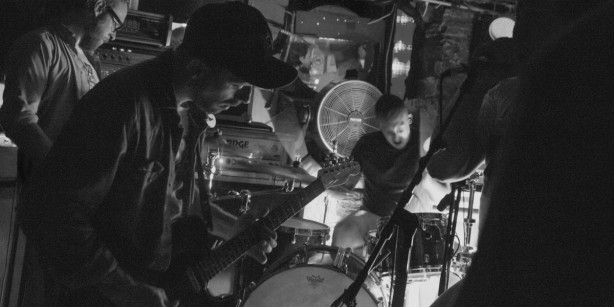
13 Québécois post-punk, post-hardcore, and emo bands Canada is sleeping on
by Mark Teo
September 17, 2014
While there’s no shortage of post-hardcore bands in Canada, when it comes to sheer concentration, few provinces are as accomplished as Quebec. No surprise there: La belle province‘s music has always had a taste for distortion and fiercely D.I.Y. ethics, and on a national level, Quebec has produced genuine stars like reluctant 2014 Polaris winners Godspeed! You Black Emperor, the exuberantly noisy Solids, and the wide-eyed post-punk of Ought (a band of expats who, with this summer’s More Than Any Other Day, produced one of the year’s best LPs).
But those bands only scratch the surface of Quebec’s post-hardcore output. And one band that recently caught our ear is Black Love, whose singer, Janic Naud, recently alerted us to the band’s new full-length. Released by a coalition of international labels—it’s being handled by Montreal’s L’Oeil du Tigre, L’Orchidoclaste, Hamilton’s Zegema Beach, the U.S.’s Don’t Live Like Me, the U.K.’s Good Post Day, Germany’s I.Corrupt, and the Ukraine’s Aorte Records—we were instantly taken by Black Love’s take on noisy, rough-around-the-edges post-hardcore.
Still, beyond their obvious touchstones—midwestern emo, screamo, and even post-rock—Naud says Black Love’s sound run deeper than those genres. “It’s hard to designate a specific post-hardcore scene in Montreal. The variety of genres and the interesting fusion between said genres makes it hard for a band to stand out only as emo or post hardcore. You can tell the Constellation Records bands cast a shadow that can still be [seen] today.”
So, one the eve of Black Love‘s release—it drops on September 30, followed by a record-release show with Jet Black, The Discord of a Forgotten Sketch, and Big Knife Little Knife—we asked the band to introduce us to Quebec’s deep ‘n’ diverse D.I.Y. scene.
Black Love
Black Love has roots in Montreal’s ’00s hardcore scene—Naud says they were friends first, and “the band was a way to re-teach us our own respective instruments”—and in their music, it shows: Outwardly, they boast a sound that recalls proto-emo acts like Indian Summer, Moss Icon, or modern screamo torchbearers like La Raein. Yet their self-titled LP shows undeniable hardcore roots—their sprawling, bleak breakdowns, for instance, immediately recalls Modern Life is War’s earliest output.
“We have a diverse palette so our main working objective to to have a cohesive end result, considering we have many layers of instruments to work with,” says Naud.
And if Black Love sounds cinematic—and they do—it’s on purpose. “The themes are somewhat universal: grief, exile, anxiety,” he says. “Most of these confront the reality of injustice. I try approaching this through bits of dialogues and other tools I stole from cinema writing. I like setting a scene first.”
Mands
Ought’s taut, speak-sung post-punk is getting a lot of love nationally, but their drummer, Tim Keen, also splits time with another project—Mands. The band, who emerged around the circle of musicians orbiting Brasserie Beaubien, trades in vicious, noise-laden post-punk, and have two releases to their name: The gritty Best Practises and a split with Lung Butter. “Mands is this interesting band [with a] noisy, angry take on post-punk,” adds Naud.
Alam al-Mithal
Of course, the province’s post-hardcore scene isn’t only located in Montreal. Naud points to Sherbrooke next, where Alam al-Mithal toil with a brand of sprawling, occasionally dour post-rock. But don’t get used to it: Naud says that the band’s shapeshifting into something else completely. “Alam al-Mithal came out sounding a lot like Slow Riot era Godspeed You! Black Emperor,” he says, “but their more recent stuff has a different identity.”
Albatros
Over in Quebec City, Albatros are refining a sound all their own: Armed with vicious vocals, d-beat drumming, and an ear for sprawling, Tragedy-esque melodies, the band tops things off with… a horn section? Believe it. “We got to play a few times with Albatros from Quebec City. They are essentially punk, with a d-beat and post-hardcore blend, but they have a tastes for brilliant harmonies,” adds Naud. “And they have a horn section.”
Jet Black
Ignore their Jawbreaker-referencing band name. Quebec City’s Jet Black don’t play minor-key pop-punk—rather, the band trades in cranked-to-11 shoegaze—and they released In Paradox, their pummeling second LP, this year. And they’re planning on exporting their pedal-drenched sound outside of Quebec’s provincial borders. “They dipped their toes in the NXNE and SXSW circuses,” says Naud. “They just released their second LP… [it’s like] MBV meets Swervedriver. It all sounds lush and full and loud.”
Atsuko Chiba
Back in Montreal, Atsuko play a brand of genre-sweeping, mostly instrumental music that ain’t easy to classify: At times, they veer into mathy terrains, while elsewhere, they dabble in prog and post-metal. Somehow, though, it works. “Atsuko Chiba in Montreal keep putting out interesting material,” says Naud. “I am still trying to figure them out.”
The Discord of a Forgotten Sketch
The Discord of a Forgotten Sketch—whose title is a mouthful—far predate Solids, Animal Faces, and the current crop of Quebec post-everything. In fact, they’re one of the longest-running screamo bands in Quebec. With countless releases under their belt, the band’s only getting noisier, more aggressive, and more vital. Naud, for his part, doesn’t just list the band as friends—he says they’re an inspiration to Black Love. “I wish I could talk about TDOAFS forever,” he says. “This band went the opposite way of most bands in defining their sound. They did it through a process of deconstruction. Our song ‘Libertines’ actually rips of one of their chord progressions. Its working title was TDOAFS.”
Gulfer
Gruff and anthemic, Gulfer play a very specific type of post-hardcore: Namely, they trade in sprightly math rock, which draws inevitable comparisons to Cap’n Jazz and Algernon Cadwallader. “Gulfer is up there. They started up there having nothing to envy to the best math rock bands and they keep pushing their sound. last year I noticed they were getting louder and a bit fuzzier. Then they added a new member and this gave them another big push musically.”
Corridor
While Solids became one of Montreal’s biggest exports—Blame Confusion was originally released independently, before being re-released by Dine Alone and Fat Possum—Naud thinks that Corridor will be the next act to court international attention. It’s easy to see why: They sing in French, but there’s a universal quality to their fuzzed-out songs. And while they boast a motorik backbone and Women-inspired guitars, on their Un magicien en toi LP, they display a pop undercurrent that’s unusual in post-punk. “They will probably be the next Montreal darlings,” says Naud. We’re inclined to agree.
Nous Étions
On first listen, Nous Étions—or for those who didn’t pay attention in French class, We Are—are a post-metal band: Indeed, the band boasts restrained guitars, molasses-thick distortion, and, occasionally, a sharp ear for melody. But the addition of brutal, guttural vocals reminds of something even more specific: Namely, Panopticon-era Isis. And that’s a very, very good thing.
No Bones
No Bones may hail from Montreal, but the Belongings 7-inch sounds like it belongs in a Gainesville parking lot. All rough hewn melodies and throat shredding vocals, the band paints with the same palette as Hot Water Music and Polar Bear Club, the stuff championed by the neckbeard-and-trucker cap set. Funny as that may seem, we were completely sold on No Bones after we heard their 7-inch’s title track, which could feel right at home on Forever And Counting. High praise, considering it’s Hot Water Music’s best album (don’t even try to argue this with us).
Bummer
Like No Bones, it’s easy to hear scraps of Hot Water Music in Bummer’s soaring vocals. But that’s where the comparisons end: Steal the Nights is bright and brassy, bookending their anthemic choruses with shoegaze filtered through a flanger pedal. It’s a peculiar brand of post-something: Sometimes, it feels like Bummer’s a hat tip to British post-punk, but at other times, it feels like they’re channeling ’90s college rock. It’s a blend that, thankfully, ain’t a bummer.
Khan
Quebec City’s Khan was the last band Naud recommended, and they’re a straight-ahead blend of crusty d-beat and pummeling hardcore. Still, their 7-inch on Doomsday Machine offers a few left turns: “Sneaky Death,” its A-side, intersperses grind bits with big-time breakdowns, while its B-side, “A Fear of Lust,” twists itself around a near-operatic melody. Grab Khan’s 7-inch as part of a Doomsday Machine box set, featuring other like-minded Quebec acts such as Dark Circles and the Cold North.
Tags: , Cancon, Lists, Ala al-Mithal, Albatros, Atsuko Chiba, Black Love, Bummer, Corridor, Gulfer, Jet Black, Khan, Mands, Montreal, No Bones, Nous Etions, Ought, Quebec, The Discord of a Forgotten Sketch





